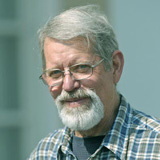First Call, First Letters in Prison
Mail Call Brings a Glimpse of Humanity, and Some Embarrassment
MAY 20-24, 2016: Within a few weeks of my arrival at the prison, things began to fall into place. I was settled in a cell with another white man (something that on the outside wouldn’t matter but is essential in prison). I finally, after what seemed like an eternity but was actually a little less than a week, got access to the phone and called my wife and children. You only get 15 minutes for a call, and in that first call, it took me a minute or two just to choke back the tears so I could speak. I thought to myself, “Pull yourself together, Dennis. You’re wasting your minutes.”

There are five floors of inmates here at MDC, each divided into two halves: a 5-North and a 5-South, a 6-North and a 6-South, and so on up to the 9th floor. Nearly all of the inmates are in a court process to determine their innocence or guilt or their sentencing. The only people in the prison actually serving their sentences are on 5-North where I am. The work force for the entire prison comes only from the 130 of us on 5-North. The men work in food services, maintenance and cleaning, plumbing, electrical, landscape and garden maintenance, etc. Most have been in prison for years and have been transferred around to various facilities, arriving here toward the end of their sentences (the last 18 months or less). This prison draws on inmates from prisons all over the country to fill and maintain the work force.
Every conceivable federal crime is represented here, from fraud to embezzlement to guns trade violations to drug violations to smuggling in goods or people, to murder, etc. Every race is represented here, with noticeably fewer whites than other races. Many here have been in the system for years, not always because they had such long sentences initially, but because when they finished their sentences they still had “paper.” This means they had some period of added probation during which, when they were unable to navigate it successfully, they were given more incarceration. For so many it is a hopeless spiral.
The crowd here is rough. Most have been working out for a long time, and they are huge. It is a rare person who is not loaded with tattoos. It seems that everyone has a steel-hardened attitude, and the vocabulary is just as harsh. I never realized how many times one could actually use some form of the word “fk” in one sentence. But at mail call, everyone seems to become a child again, craving to experience some expression of love delivered in a letter. It is a rare moment of transparency, and one realizes that all of their humanity is still in there. It’s just covered with leathery layers of years of prison life and culture.
The food here is not for the faint of heart. Cold items are on sectioned cafeteria-style trays prepared hours before the meal and stored in refrigerated, shelved, metal lockers on wheels. Hot items are also prepared at least five hours before the meal and are in 5″ by 6″ dark brown plastic compartmentalized containers that when the meal is served (lukewarm), are inserted into the largest section of the cold item tray. The lack of value shown to the inmate as a human being with this kind of “attention to detail” (and there are many other examples other than the food) conspires to sap the self-worth of men struggling to rise in a world they have mostly experienced as unjust and hostile. It is not surprising that the general attitude is every man for himself, survival of the fittest.
About my fourth day I got my first mail, four letters; two from my family. Mail call comes after dinner and is always a little embarrassing for me. A large group of men gather around a steel table in the common area, each hoping that their name will be called by the guard on duty. Some men never even attend the gathering, knowing that nothing will have come for them. Clearly there are many more men than there are pieces of mail. It’s hard to see the disappointed faces of those who are not called, especially when my name is called four times. One night I received 12 letters and two books. “Hey, man, is it your birthday or something?”
I identify as a Catholic. Mondays are the day for Catholic Mass here, and so, this past Monday, I attended. When I arrived at the “chapel” there was, out of an institution of nearly 800 inmates, only one other inmate there. At the previous two Masses, fights broke out, and now guys were afraid to come.
The priest let the two of us split the readings, and after communion he sat at the piano and led us in a hymn, “Here I Am Lord.” I prayed for my wife and children, and for my 92-year-old mom, and for Louise LaMothe, the judge who sent me here. And I reflected on the people of the Marshall Islands who have, for decades, been irradiated and abused by our nuclear testing program. Resistance to that injustice, among others, is my reason for being here, and I asked God to help keep me grounded in that. It’s not easy sometimes.
Dennis Apel is serving four months in the federal Metropolitan Detention Center in Los Angeles, having been found guilty of crossing the “green line” during peaceful protest at Vandenberg Air Force Base, and then refusing to comply with supervised probation.



